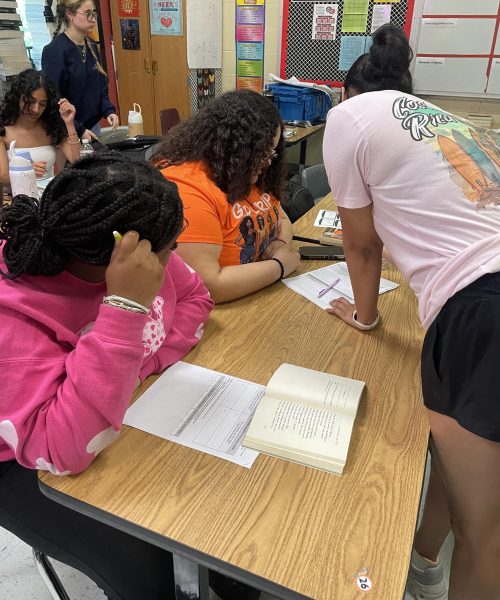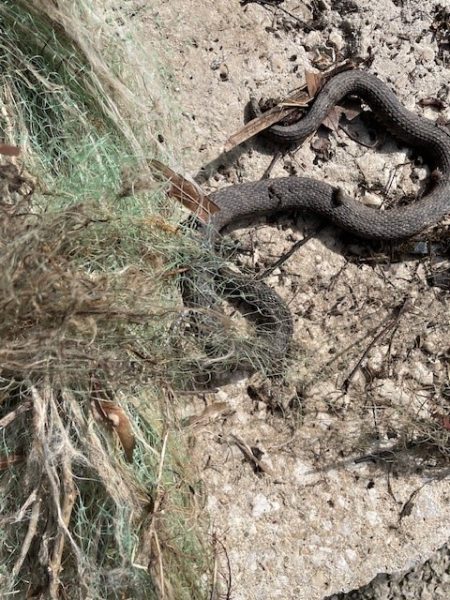School Spirits
Out with the old, in with the booze
A certain student, I’ll call him Jeff*, has a motto—“If your head doesn’t hurt on Monday, you didn’t have a good weekend.” As I interviewed Jeff, he spun the conversation around, asking me a question instead. “Did your head hurt this morning?” I laughed. “No. I stayed home and watched [low quality] movies.”
“I did not,” he laughed. “I drank some [low quality] alcohol.”
He pulled out his wallet and fanned several twenties. “You see this?” he laughed. “This is booze money.”
Jeff says that he is practically an expert at hiding his weekend activities from the authorities, but he has had his run-ins with the police. He gestured as if he was about to share such a run-in, and then he laughed, remembering an inside joke, so then he proceeded to list his favorite drinking spots, pointing them out on a shape of Kentucky he made with his right hand.
It starts when you’re young
I remember playing beer pong in Janet’s basement when I was just 13. Except we used sparkling grape-flavored water in red solo cups, and we played on her tile floor because the ping pong table was stacked with moving boxes.
We pretended to get dizzy, and we added slurs to our fully-coherent sentences. While swaying in my pseudo-tipsy state, I attempted an under-the-leg shot, slipping on spilled juice and bloodying up my knees on the floor. We plodded up the stairs to the kitchen, laughing at the consequence of my competitive nature. Her mother thought our game was cute, and she proceeded to patch me up with Spongebob band-aids, giving me a couple of no-bake cookies.
At the time, I had no idea that beer pong had “rules.” That it got more difficult as you became more drunk. Or that quitting just because I had a few scrapes would make me a sissy. It wasn’t about playing and trying your best; it was about winning. I just thought it was fun and games.
Things took a turn for the worse
I sat down with Eugene and asked him if he had any stories for me to put in this article. His eyes got wide and he proclaimed, “There was this one time where Carl and I nearly [messed] our pants.”
In the four years I’ve known Eugene, he’d never struck me as hyperbolic, so I figured this was going to be an interesting, and totally legitimate, story. He prepped for the telling, folding his hands in his lap. Then he started explaining how he and his friend Carl were meeting some other kids at a rave. He said that once they’d taken several shots from the alcohol hidden under their front seat, things took a turn for the worse.
“There were bouncers there, like really big,” he said, raising his hand above his head to show the height, “and they came running out and started pointing at us saying not to go anywhere, that the cops were coming because we had poisoned some kid with drugs, so I started flipping out saying, ‘I have no clue what you’re talking about’ and they said, ‘There’s some kid in there on the floor passed out like having seizures or something. He’s on drugs you guys gave him. I saw you.’”
Eugene continued recounting the story, becoming more and more animated. He said, “so I haven’t even been in the place so I get back in my car, tell everyone we’re leaving and start the engine. Of course, right around the parking lot, these four cop cars just zoom in, so I can’t leave. I have to stop the car and get out. Everyone in my car jets and leaves me, another kid, and all our alcohol in the car. The bouncers take my keys and the keys of everyone else who was there, and I’m doing my best sweet talking I‘ve ever done to these bouncers. I explained that I hadn’t even been to the party, and then I totally agreed with him that the person who did that should get in trouble–all this stuff. He seemed like he was starting to believe me, so I showed him that I didn’t have a stamp on my hand. ‘I promise you I was not in there.’”
At that point, Eugene said that the cops had already started breathalyzing to see if any kids were intoxicated. “I was afraid because they saw my engine was started, and they could get me for something, so as the police were getting ready to search our car, I finally convinced the bouncer to give me my keys back. I left immediately. It was a really scary run-in with the police.”
Eugene laughed, reveling in his luck, but I was still curious about the boy who had apparently been poisoned inside the party. He said, “Yeah, I don’t actually know what happened to him.”
Blurred red solo party pics
As a senior, I hear a lot of stories about my college freshmen friends getting drunk on the weekends. I recently asked a high school friend if she thought those same people partied like that in high school, too. She said no–they never had anyone to get them alcohol. On Instagram, we see posts about some of the college freshmen girls with captions like “RIP Betty” or “Betty just couldn’t handle tonight.” But apparently she could handle herself well enough to tweet a request for a designated driver.
The blurred red solo party pics evoke different reactions in people: longing to be in college, reminiscing about their last party or swearing sobriety. When I think of partying, I imagine everyone gathered around a fire, drinking strong bourbon like they do in Perks of Being a Wallflower. But this isn’t the 90’s and this isn’t a movie.
At least that’s what I thought before the same friend told me about her brother and his girlfriend. She said that they actually do those things I thought was only in movies—settle around a fire after riding 10-speed bikes around campus and then arriving home to a full liquor cabinet. I now see that real high school parties aren’t hard to come by, just hard to remember.
It’s the middle of her junior year, and Helen is in the party crowd. She is well-liked and is good at keeping her social life separate from her school and home life. It’s a Saturday night and Helen is enjoying herself at a house party. Until she suddenly runs to the bathroom and goes face down in the porcelain.
All she can think is that she has never been this sick before. She has a hollowing pain in her abdomen and she barely registers her phone ringing in her back pocket.
“Oh, hi mom,” she says. “Hi honey, I’m coming to pick you up now.” “No, mom. You don’t have to come. I have another ride home. I’ll be there in an hour.” “Honey, I’m already out. I’m just going to swing by and get you.” Click.
Helen drags herself up off the tiled floor and splashes some cold water on her face before dropping onto all fours to keep herself from falling over involuntarily. She bear crawls up the basement stairs and to the front door, only to puke in the bushes as well.
Her mother’s car pulls up around the corner and she plops herself in the backseat, immediately resisting the urge to puke all over the back of the leather upholstered front seat where her younger brother sits. But it doesn’t last long. She grabs her purse from the floor of the backseat and raises it underneath her chin, catching a silent heave. Her mom keeps up the conversation, never suspecting a thing.
A few days later, as she takes the amoxicillin pill she has been on for the past week for a virus, Helen begins to wonder why she had such a bad reaction to the alcohol that night. Then she turns the bottle over. It reads “Do not mix with alcohol. Serious reactions may occur.”
A Rite of Passage
When I was an eighth grader, I thought being 13 made me better than everyone else. Naturally. During lunch we sat next to the popular guys, all of whom we created nicknames. Sometimes, when we weren’t talking about them, we would listen to them talk about us.
It wasn’t always innocent flirtations, though. Sometimes we ventured into the taboo–how cool we would be in high school, and directly linked to that, what kind of drunks we would be. Even at 13 years old, we knew that drinking was considered a “rite of passage” by most teens.
Only one of our seven had ever even tasted alcohol before so she was pretty much our spirit guide. None of us drink now, but we had vivid imaginations and different visions of who we would become back then.
We decided that one of us would be a crazy drunk, another would be a fun drunk and yet another would be a flirty drunk, describing our versions of what that would look like. As we went around, a little loudly so the guys could pitch in their own guesses, a unanimous chorus of “irritating drunk” echoed from both tables. It felt like name tags appeared on my shirt reading, “prudish,” “too grown up” and “wet blanket.”
There is nothing as traumatizing to a 13-year-old girl as being called lame in front of boys. I was so scared that I wouldn’t be a likable drunk, I never gave anyone the chance to find out. So yeah, I did get the most disappointing tag, but maybe that has worked out for the best?
I might as well drink more
When Oliver went out on one July Saturday, he didn’t suspect he’d awake to needles and a hospital admission wrist band.
“I woke up and there was a doctor in my face at like 5 a.m. I looked down and I had scrubs on, and he had this flashlight in my face.” Although he doesn’t remember everything, Oliver remembers .35–his blood alcohol level.
The night started like any other of Oliver’s summer escapades as he arrived at the bonfire with several of his friends.
“At first I didn’t have any alcohol with me,” he said. “Then everyone kept giving it to me. I just kept drinking and drinking, and I took numerous shots—like eight, I think. And then I drank a handle of vodka.”
He must have thought I was underestimating the problem at this point because he followed up. “That was in a span of like 10 minutes.” He took my wide eyes and gaping mouth as a cue to continue. “It took a while for it to kick in so I was like ‘Oh, not drunk yet. I might as well drink more.’”
Benjamin, a member of Oliver’s group that night, told me, “About an hour or two in, he started…he was really bad off. He started stumbling around, tripping, falling down, couldn’t really function that well.” The last thing Oliver remembers is sitting down in a lawn chair and passing out.
“We weren’t too concerned because that happens to a lot of people,” Benjamin said. “But we realized how much he had been drinking…’cause we found an empty bottle–he had drunk an entire handle by himself.”
He added, “that is a ridiculous amount for even two people to split.”
Benjamin said that he and his friends finally turned their attention to Oliver, and became afraid of what they saw.
“He started foaming at the mouth and spitting up stuff so we started freaking out, and me and couple people came over and helped him up. We dragged him to someone’s car. It took like five people to help him; he was flailing everywhere.” Then he remembered something else. “It was in someone’s new car, too, and he just started puking in it.”
He went on to explain what the people who took Oliver home did next.
“Luckily, I wasn’t the one who had to tell his parents,” said Benjamin. “Once they were aware of how much alcohol their son had consumed, Oliver’s parents called an ambulance.
Benjamin said, “The entire night I was just freaking out; I couldn’t sleep.” In the morning, Oliver said he tried to comprehend where he had just spent five hours before regaining consciousness.
Then he looked at me warily, trying to explain that he’d learned his lesson. “At that point, I was like, ‘No, I’m not drinking again,’” he said before looking away sheepishly. “Obviously stuff’s changed for me.”
Oliver did not drink for three months following the accident, and he said that alienated him from his previous group of friends.
“I was grounded for a while; I kind of isolated myself.”
He said the emotional punishment, however, far outweighed the forced isolation.
“My parents didn’t trust me anymore. I broke that,” he said. “Now I tell them what I’m doing, where I’m going, who I’m going with.”
Benjamin remembers that night as one of his last experiences with Oliver. “That was kind of the last time we hung out with him,” he said.
When asked if he was worried about another case of alcohol poisoning, he said, “The rest of us had never been that bad off. We weren’t really concerned that we were going to drink an entire handle ourselves.”
You have to get off me
Candice props herself against a door to get some needed fresh air as she recounts the events of Halloween night her freshman year.
We’re outside because she doesn’t want anyone to overhear. Arriving at a party in her costume, she said that she soon realized she was in over her head (cat ear headband and all).
“I got pretty drunk, and at one point I saw Henry sitting in an open closet. He called out to me, ‘Hey, come sit here with me.’ I thought he needed help. I figured he’d fallen down. I went in and gave him my hand, but instead of me pulling him up, he pulled me down.”
She squats, sitting on her feet, bouncing lightly and constantly readjusting as if both getting comfortable and preparing to leave at the same time. She seems nervous.
“I didn’t really mind sitting there talking to him until he started trying to get on top of me. It got to the point where he was trying to make more room in the closet for both of us.”
While explaining this, Candice moves her hands backward in a scooping motion to illustrate how he was lobbing stuff out of the closet.
“At first, I was afraid he was going to hit me with something because he was not paying attention to where he was throwing things. I was trying to get out of the closet, but as I was getting up, he grabbed me back down next to him. Hard.”
As she continued with the story, she mimed the motion, pounding a nearby door with such force it startled me.
“He was pretty strong even though he was drunk. I wanted to leave and return to the party, and he was like, ‘No, I want to be in here with you.’”
She said, “I told him, ‘You have to get off me.’ And he wouldn’t listen to me. He pinned my arms down so I couldn’t push him off. I could see people walking by, but no one came in because they probably thought we wanted privacy. I didn’t. He groped at me, and tore my skirt trying to get it off. That’s when I actually got nervous because I couldn’t fight him off. I thought, ‘what’s he actually gonna do?’”
As she explained this, I wondered out loud why no one came to help if she’d been calling out. She said that she wasn’t being very loud. “I didn’t want to scream and make a big deal yelling because I knew he probably wouldn’t hurt me, plus I didn’t want to make him upset. I remember just saying, ‘hey guys, hey, hey’ to people who walked by. I don’t know if anyone could hear me or not, but no one came to help.”
Fortunately, she said, a couple finally walked over. “I was obviously trying to get Henry off me, but the boy said, ‘Come on, Candice. You gotta get with him.’ But then his girlfriend said, ‘Don’t force her to do anything. If she doesn’t want to be with him, she doesn’t want him.’”
She paused for a moment, then continued. “I knew I needed to leave while they were still there.” She explained her strategically mapped out escape: “I moved as if to sit up, and then jumped out of the closet so fast he couldn’t stop me.”
Sadly, escaping the closet wasn’t the end.
“I just remember hearing everyone saying later at school, ‘Hey, I heard what you and Henry did in the closet. People saw you.’ I’d respond, ‘I don’t know what you saw, but that’s not it.’ People didn’t believe me. They thought I was just trying to talk it off or whatever.”
Her face slightly winced at this last line. The mental and emotional assault seemed almost as debilitating as the physical one. “Being in the closet was scary because I didn’t know what he was going to do. When people started walking by, and they weren’t doing anything, it made me worried, like what if he actually did…”
She pushed her hair out of her face and looked me straight in the eye. “I thought, ‘he’s gonna stop when I tell him to stop.’ Then I realized he might not.”
*These are true stories, so all of the names have been changed to protect students’ identities.
I'm obsessed with manatees.




























Jake Whitt • Mar 15, 2015 at 10:22 PM
Just thought I’d say that this is a fantastic story. All of the stories are very powerful and well represented. Have to say I’m impressed, keep up the good work!